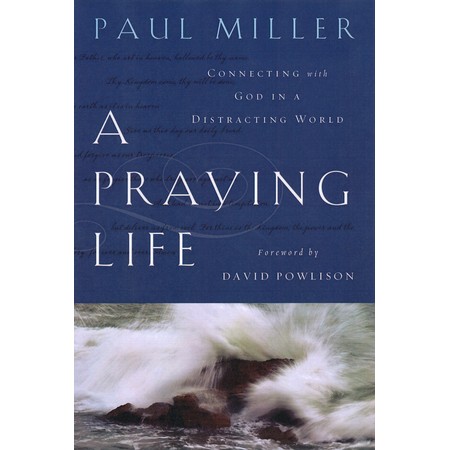Examining the Praying Life

I was camping for the weekend in the Endless Mountains of Pennsylvania with five of our six kids. My wife, Jill, was home with our eight-year-old daughter, Kim. After a disastrous camping experience the summer before, Jill was happy to stay home. She said she was giving up camping for Lent.
I was walking down from our campsite to our Dodge Caravan when I noticed our fourteen-year-old daughter, Ashley, standing in front of the van, tense and upset. When I asked her what was wrong, she said, "I lost my contact lens. It’s gone." I looked down with her at the forest floor, covered with leaves and twigs. There were a million little crevices for the lens to fall into and disappear.
I said, "Ashley, don't move. Let's pray." But before I could pray, she burst into tears. "What good does it do? I’ve prayed for Kim to speak, and she isn't speaking."
Kim struggles with autism and developmental delay. Because of her weak fine motor skills and problems with motor planning, she is also mute. One day after five years of speech therapy, Kim crawled out of the speech therapist's office, crying from frustration. Jill said, "No more," and we stopped speech therapy.
Prayer was no mere formality for Ashley. She had taken God at his word and asked that he would let Kim speak. But nothing happened. Kim's muteness was testimony to a silent God. Prayer, it seemed, doesn't work.
Few of us have Ashley's courage to articulate the quiet cynicism or spiritual weariness that develops in us when heartfelt prayer goes unanswered. We keep our doubts hidden even from ourselves because we don’t want to sound like bad Christians. No reason to add shame to our cynicism. So our hearts shut down.
The glib way people talk about prayer often reinforces our cynicism. We end our conversations with "I'll keep you in my prayers." We have a vocabulary of "prayer speak," including "I'll lift you up in prayer" and "I'll remember you in prayer." Many who use these phrases, including us, never get around to praying. Why? Because we don't think prayer makes much difference.
Cynicism and glibness are just part of the problem. The most common frustration is the activity of praying itself. We last for about fifteen seconds, and then out of nowhere the day's to-do list pops up and our minds are off on a tangent. We catch ourselves and, by sheer force of the will, go back to praying. Before we know it, it has happened again. Instead of praying, we are doing a confused mix of wandering and worrying. Then the guilt sets in. Something must be wrong with me. Other Christians don't seem to have this trouble praying. After five minutes we give up, saying, "I am no good at this. I might as well get some work done."
Something is wrong with us. Our natural desire to pray comes from Creation. We are made in the image of God. Our inability to pray comes from the Fall. Evil has marred the image. We want to talk to God but can't. The friction of our desire to pray, combined with our badly damaged prayer antennae, leads to constant frustration. It’s as if we've had a stroke.
Complicating this is the enormous confusion about what makes for good prayer. We vaguely sense that we should begin by focusing on God, not on ourselves. So when we start to pray, we try to worship. That works for a minute, but it feels contrived; then guilt sets in again. We wonder, Did I worship enough? Did I really mean it?
In a burst of spiritual enthusiasm we put together a prayer list, but praying through the list gets dull, and nothing seems to happen. The list gets long and cumbersome; we lose touch with many of the needs. Praying feels like whistling in the wind. When someone is healed or helped, we wonder if it would have happened anyway. Then we misplace the list.
Praying exposes how self-preoccupied we are and uncovers our doubts. It was easier on our faith not to pray. After only a few minutes, our prayer is in shambles. Barely out of the starting gate, we collapse on the sidelines — cynical, guilty, and hopeless.
American culture is probably the hardest place in the world to learn to pray. We are so busy that when we slow down to pray, we find it uncomfortable. We prize accomplishments, production. But prayer is nothing but talking to God. It feels useless, as if we are wasting time. Every bone in our bodies screams, "Get to work."
When we aren't working, we are used to being entertained. Television, the Internet, video games, and cell phones make free time as busy as work. When we do slow down, we slip into a stupor. Exhausted by the pace of life, we veg out in front of a screen or with earplugs.
If we try to be quiet, we are assaulted by what C. S. Lewis called "the Kingdom of Noise." Everywhere we go we hear background noise. If the noise isn't provided for us, we can bring our own via iPod.
Even our church services can have that same restless energy. There is little space to be still before God. We want our money's worth, so something should always be happening. We are uncomfortable with silence.
One of the subtlest hindrances to prayer is probably the most pervasive. In the broader culture and in our churches, we prize intellect, competency, and wealth. Because we can do life without God, praying seems nice but unnecessary. Money can do what prayer does, and it is quicker and less time-consuming. Our trust in ourselves and in our talents makes us structurally independent of God. As a result, exhortations to pray don't stick.
It's worse if we stop and think about how odd prayer is. When we have a phone conversation, we hear a voice and can respond. When we pray, we are talking to air. Only crazy people talk to themselves. How do we talk with a Spirit, with someone who doesn't speak with an audible voice?
And if we believe that God can talk to us in prayer, how do we distinguish our thoughts from his thoughts? Prayer is confusing. We vaguely know that the Holy Spirit is somehow involved, but we are never sure how or when a spirit will show up or what that even means. Some people seem to have a lot of the Spirit. We don't.
Forget about God for a minute. Where do you fit in? Can you pray for what you want? And what's the point of praying if God already knows what you need? Why bore God? It sounds like nagging. Just thinking about prayer ties us all up in knots.
Has this been your experience? If so, know that you have lots of company. Most Christians feel frustrated when it comes to prayer!
Let's imagine that you see a prayer therapist to get your prayer life straightened out. The therapist says, "Let's begin by looking at your relationship with your heavenly Father. God said, 'I will be a father to you, and you shall be sons and daughters to me' (2 Corinthians 6:18). What does it mean that you are a son or daughter of God?"
You reply that it means you have complete access to your heavenly Father through Jesus. You have true intimacy, based not on how good you are but on the goodness of Jesus. Not only that, Jesus is your brother. You are a fellow heir with him.
The therapist smiles and says, "That is right. You've done a wonderful job of describing the doctrine of Sonship. Now tell me what it is like for you to be with your Father? What is it like to talk with him?"
You cautiously tell the therapist how difficult it is to be in your Father's presence, even for a couple of minutes. Your mind wanders. You aren't sure what to say. You wonder, Does prayer make any difference? Is God even there? Then you feel guilty for your doubts and just give up.
Your therapist tells you what you already suspect. "Your relationship with your heavenly Father is dysfunctional. You talk as if you have an intimate relationship, but you don't. Theoretically, it is close. Practically, it is distant. You need help."
I needed help when Ashley burst into tears in front of our minivan. I was frozen, caught between her doubts and my own. I had no idea that she'd been praying for Kim to speak. What made Ashley's tears so disturbing was that she was right. God had not answered her prayers. Kim was still mute. I was fearful for my daughter's faith and for my own. I did not know what to do.
Would I make the problem worse by praying? If we prayed and couldn't find the contact, it would just confirm Ashley's growing unbelief. Already, Jill and I were beginning to lose her heart. Her childhood faith in God was being replaced by faith in boys. Ashley was cute, warm, and outgoing. Jill was having trouble keeping track of Ashley’s boyfriends, so she started naming them like ancient kings. Ashley's first boyfriend was Frank, so his successors became Frank the Second, Frank the Third, and so on. Jill and I needed help.
I had little confidence God would do anything, but I prayed silently, Father, this would be a really good time to come through. You've got to hear this prayer for the sake of Ashley. Then I prayed aloud with Ashley, Father, help us to find this contact.
When I finished, we bent down to look through the dirt and twigs. There, sitting on a leaf, was the missing lens.
Prayer made a difference after all.

Original publication date: May 15, 2009
Originally published May 15, 2009.







